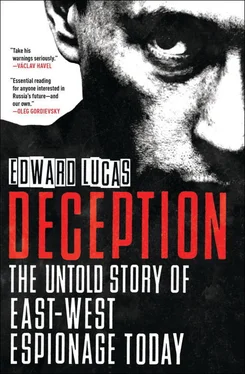The story starts with Alexander ‘Sandy’ McKibbin, born in pre-revolutionary Russia, and then a timber-merchant in pre-war Estonia (and probably on the books of British intelligence) 4. During the war, he worked for the SIS station in Stockholm: in those days one of the great spy nests of Europe. His main job was spying on the Nazis, who had occupied the Baltic states in 1941 and were now fighting a losing defensive battle against the advancing Soviet forces. Meanwhile the Lithuanian underground, hoping against hope to re-establish the country’s independence, was eager to make contact with Western powers. One of its representatives was a regular visitor to Sweden and made contact with McKibbin, who signed him up. 5(The British spy also contacted an Estonian underground leader, until his capture and torture by the Gestapo in 1944 led to the destruction of his network.) 6
From the Baltic point of view, the Nazis and Soviets were not hugely different. This perspective will be startling to those who see Hitler’s Germany as the fount of all evil and the Soviet Union as a valiant (if ill-led) ally against it. But in the Baltic as in much of Europe the war was a three-way fight. In one corner were the Nazis, with an imperial doctrine based on racial supremacy, in the other the Soviets, who mixed Russian imperialism with the ideology of class warfare. In the middle, bearing the brunt of the bloodshed, were the peoples whose countries the Nazi–Soviet pact had obliterated. As the Lithuanian poet Tomas Venclova notes, the war years offered the Baltics a choice between Hitler, Stalin and death, with one choice not necessarily precluding the others. 7
By the time of the first tentative contacts between the resistance and foreign intelligence, the damage inflicted by both fighting and invasion was severe. The forcible annexation and Sovietisation of the three Baltic countries in 1940 was followed in June 1941 by the deportation of much of the pre-war elite, 8typically in the middle of the night, with an hour’s notice. The class enemies, loaded on to cattle trucks to freeze, starve and suffer in distant labour camps, included: members of ‘anti-Soviet’ political parties (whether of left or right), police, prison officers, military officers, political émigrés and ‘unstable elements’, foreign citizens, ‘individuals with foreign connections’ such as stamp collectors, senior civil servants, Red Cross officials, clergy, noblemen, industrialists and merchants. These comprised 10,000 people from Estonia, 15,000 from Latvia and 34,000 from Lithuania. They included much of the middle-class Jewish population of all three countries. As the Yale historian Timothy Snyder has pointed out, it would have been little comfort to those Jews to know that they were being persecuted for their class, not their race.
When the Soviet forces returned in 1944, those who had failed to flee and showed any sign of resistance or independent thought were repressed as ‘bourgeois nationalists’. 9This traumatic history is the emotional and strategic backdrop for the espionage debacles of the following years, for the independence struggle of the 1980s, and for the headlong embraces between Western spy services and their Baltic counterparts in the 1990s. Juozas Lukša, a CIA-trained Lithuanian resistance fighter, later wrote:
In 1940, the Russians had come marching into our land to ‘liberate’ us from ‘capitalist and Fascist exploiters.’ In 1941, the Germans had marched in after them and thereby ‘liberated’ us from ‘Bolshevik bondage.’ And now, the Russians were back again – this time to ‘liberate’ us from ‘the tyranny of Nazi hangmen.’ But since we still recalled how they had gone about ‘liberating’ us the last time, we didn’t think we had any cause to rejoice. 10
Helping the Soviets beat the Nazis made sense from a Western point of view (and was a question of life and death for the region’s surviving Jews) but the bungling that followed was inexcusable. British intelligence was keen to find out what was happening in the occupied Baltic states, chiefly to know if the Soviet Union was planning a further push westwards. On 15 October 1945 it sent a boat with four agents from Sweden to Latvia on a reconnaissance mission. Unfortunately, it capsized and the men were caught and tortured to the point of insanity. Their ciphers and radio transmitters fell into the hands of Jānis Lukaševičs, a brainy officer of the Latvian KGB. Here was proof that SIS operations against the Soviet Union had restarted – but how to respond? Waiting for more spies to come and trying to hunt them down was clumsy and risky: far better to lure future British agents into a trap. The operation was labelled Lursen-S 11though it is usually called ‘Red Web’ – the name of a book in 1989 by the British author Tom Bower, who first unveiled its dark secrets.
In March 1946 Lukaševičs forced a Latvian [50] ax Augusts Bergmanis.
who had operated a radio for the British during the war to start sending messages again, claiming that the agents had given him their codes and radio before capture. Perhaps unsurprisingly, the British eventually responded. A second SIS mission to Latvia in 1946 landed two agents [51] ay Rihards Zande and Ēriks Tomsons.
tasked with finding out what had happened to the previous mission. But the new arrivals’ transmitter proved faulty. In an even graver breach of tradecraft, SIS instructed them to make contact with the existing – KGB-controlled – radio operator. That forged a fatal link between the new British operations and the compromised network now controlled by the KGB. With one thread in the web spun, Lukaševičs did not order the men’s arrest. He wanted a bigger haul. SIS instructed its agents (now under KGB surveillance) to meet other British agents on the ground. That provided the Soviets with more leads and clues. Other efforts were equally farcical. Two more agents ended up stranded in Latvia and were arrested, along with their networks. Another émigré, Feliks Rumnieks, was instructed to return to Latvia and make contact with the KGB in order to work as a double agent. He was arrested and confessed everything.
Meanwhile the Lithuanian KGB was playing a similar game. It sponsored a rival resistance movement to the main partisan outfit. 12The bogus organisation’s underground leader was a distinguished American-born Lithuanian, Juozas Albinas Markulis, seemingly stalwart, but in fact a traitor since 1944. Such ruses not only divided and distracted the anti-communist cause abroad. They also helped uproot real resistance at home. On 18 January 1947 Markulis summoned a meeting of all the partisan leaders in Lithuania. Though Lukša – a genuine anti-communist of remarkable brains, courage and eloquence – was sceptical, others were trusting: after all, Markulis was in contact with the revered British intelligence service. The Lithuanians walked straight into a KGB ambush. In a similar ruse in Latvia, Lukaševičs arranged for fourteen senior partisan leaders to be summoned for a meeting in Riga with representatives of the ‘Latvian government-in-exile’ and a representative of the ‘British secret service’. To allay their suspicions, each leader was told to provide a photo, and in return received a valid Soviet ID card – supposedly proof of British prowess in forgery. On 13 October the unsuspecting men briefed the ‘British’ visitor on every detail of their operations. They were then arrested and never seen again.
Behind the Iron Curtain, trust in the West was still profound. An underground newspaper in Lithuania proclaimed in June 1947:
The world’s greatest scholars and most famous strategists – Eisenhower, Montgomery, Adm. Nimitz and scores of others – are gathering weapons and plans from all countries to collectively eliminate criminal-infected Moscow as the sole hindrance of freedom. 13
Читать дальше












